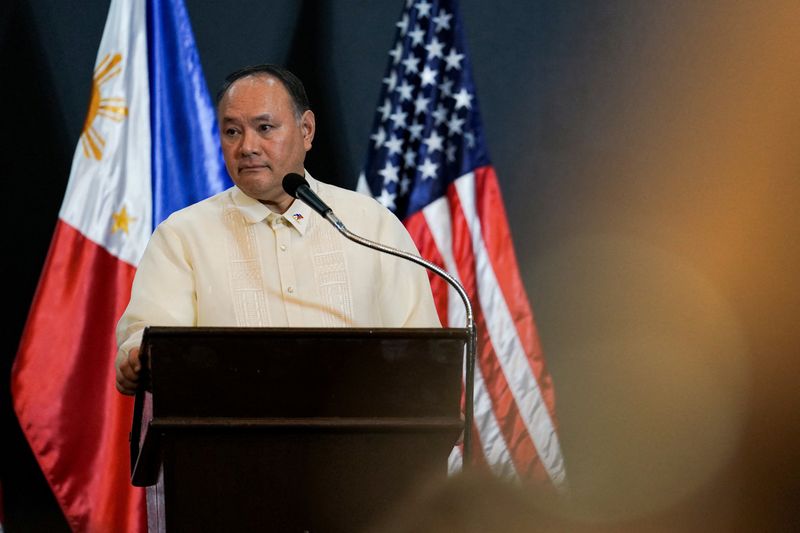By Mikhail Flores and Karen Lema
MANILA (Reuters) -The Philippines’ defence treaty with the United States must be interpreted more broadly to tackle a “dynamic and cunning adversary”, its defence chief said on Tuesday, after recent encounters between Manila and Beijing in the South China Sea.
Manila and Washington are bound by the 1951 Mutual Defence Treaty (MDT), which can be invoked in case of armed attacks on Philippine forces, public vessels, or aircraft in the South China Sea.
While the United States has reassured its oldest Asian ally that their defence partnership is “ironclad”, Philippine Defense Secretary Gilberto Teodoro called for the pact to be made “more dynamic” to avoid falling into “China’s trap”.
Speaking on the sidelines of a military forum organised by the U.S. Indo-Pacific Command, Teodoro said the partners were in conversations regarding such a possibility.
“The mutual defence treaty should be interpreted dynamically,” he told the forum.
“And the biggest danger for us is to narrow down … our operational limitations, which is contrary, perhaps, to what a potential aggressor does when it expands.”
He also urged regional nations to call out China, which he described as the “biggest disruptor of peace”, for its activities in the busy waterway.
“I believe they’re not undeterrable because it’s just a question of getting a worldwide consensus,” Teodoro said.
It was critical for the Philippines, in collaboration and on its own, to create enough deterrence militarily to show China it was serious about protecting its sovereignty and would fight for it, he added.
Teodoro’s remarks follow a series of maritime and air confrontations between the two countries in the South China Sea in the past week as Beijing pressed its claim to the waterway and Manila kept up supply missions to features it occupies.
U.S. escorts for Philippine vessels on resupply missions in the South China Sea were “an entirely reasonable option”, the head of the U.S. Indo-Pacific Command said on Tuesday.
Such an option, however, was subject to consultation between the two countries, U.S. Indo-Pacific Command commander Samuel Paparo told reporters on the sidelines of the forum.
China claims sovereignty over nearly all of the South China Sea, including areas claimed by Brunei, Indonesia, Malaysia, the Philippines, Taiwan and Vietnam. Beijing has deployed an armada of vessels to protect its claims.
In 2016, an international arbitration tribunal ruled that Beijing’s claim had no basis under international law in a landmark victory for the Philippines, which filed the case. Beijing rejects that decision.
(Reporting by Mikhail Flores and Karen Lema; Editing by John Mair and Clarence Fernandez)
